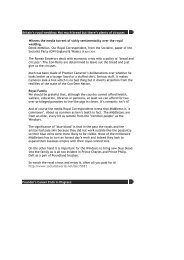Youth, Knowledge and Violence - Centre for Civil Society
Youth, Knowledge and Violence - Centre for Civil Society
Youth, Knowledge and Violence - Centre for Civil Society
Create successful ePaper yourself
Turn your PDF publications into a flip-book with our unique Google optimized e-Paper software.
inspiring “assignments”. Only these would guarantee him a “dreaded” position within the cult <strong>and</strong> on campus<br />
among his fellow students.<br />
Inter-cult violence <strong>and</strong> conflicts have over time turned most Nigerian campuses into notorious gangl<strong>and</strong>s<br />
where guns, knives, axes, acidic substances <strong>and</strong> other dangerous weapons are freely used. Also the cults’ secretive<br />
character has posed an immense problem not only <strong>for</strong> innocent students, university administrators but also <strong>for</strong> the<br />
law en<strong>for</strong>cement agencies <strong>and</strong> government. It is important to note that constitution states:<br />
Nothing in this section shall entitle any person to <strong>for</strong>m; take part in the activity<br />
or be a member of a secret society; <strong>and</strong> <strong>for</strong> the purposes of this subsection, a<br />
secret society means a society or association not being a solely cultural or<br />
religious body that uses signs, oaths, rites or symbols (a) whose meeting or other<br />
activities are held in secret <strong>and</strong> (b) whose members are under oath, obligation or<br />
other threat to promote the interest of its members or aid one another under all<br />
circumstances without due regard to merit, fair play or justice, to the detriment<br />
of the legitimate expectations of those who are not members. 38<br />
If the constitution frowns upon the activities of secret cults, most Nigerian governments in recent times have also<br />
displayed attitudes that impede the growth of civil society in which freedom of thought <strong>and</strong> conscience is respected.<br />
In 1989, <strong>for</strong> instance, the Federal Government promulgated the Students Union Activities control <strong>and</strong> Regulation<br />
Decree (Decree 47) to contain the vibrant student unionism in Nigerian universities. And then under S.3(1) of the<br />
decree:<br />
the minister is empowered, whenever he is of the opinion that public interest or<br />
safety so dem<strong>and</strong>s, so suspend <strong>for</strong> any specified period of time, remove,<br />
withdraw, or expel any student, undergraduate or post-graduate, from any<br />
university, institution of higher learning or similar institution. This power here<br />
conferred on the Minister could be delegated under S.3(2) (a) <strong>and</strong> (b) to any<br />
person or body authorized by the Minister to do so on his behalf or the<br />
governing council, Vice-Chancellor or any authority or person in charge or of in<br />
control of that institution. 39<br />
It is immediately obvious what this draconian decree means <strong>for</strong> academic freedom <strong>and</strong> university autonomy.<br />
Nonetheless, student unionism in Nigerian universities is now allowed but it could be banned anytime the<br />
government wishes given the entrenched authoritarian nature of the state.<br />
Perhaps the federal government could borrow a leaf from the United States of America in combating the<br />
menace of secret societies. One is not advocating a slavish adoption of values <strong>and</strong> actions. Rather, we should study<br />
how their various authorities are confronting the problem of organized crime in schools. To be sure, law<br />
en<strong>for</strong>cement authorities ought to be concerned with the activities of secret cults because they are likely to impede<br />
the health <strong>and</strong> development of civil society. In this regard, it may be argued that the very concept of democracy,<br />
becomes jeopardized within the larger social space when <strong>and</strong> if secret cultism becomes the norm. Democracy<br />
entails openness <strong>and</strong> accountability <strong>and</strong> in a context where transparency becomes anathema, democratic norms<br />
inevitably become endangered. Accordingly, “courts have pointed out that secret societies can have a detrimental<br />
influence on the schools by tending to destroy good order, discipline <strong>and</strong> scholarship. They may be considered antidemocratic<br />
in their exclusiveness <strong>and</strong> out of place in a public school open to all on equal terms. Various<br />
<strong>for</strong>mulations of themes of individual rights of parents <strong>and</strong> students have not prevailed.” 40 Similarly, perhaps it is<br />
not out of place to note that a statute enacted by Cali<strong>for</strong>nia State stipulates:<br />
From <strong>and</strong> after the passage of the Act, it shall be unlawful <strong>for</strong> any<br />
pupil, enrolled as such in any elementary or secondary school of this<br />
state, to join or become a member of any secret fraternity, sorority or<br />
club, wholly or partly <strong>for</strong>med from the membership of pupils attending<br />
38<br />
The Nigerian Constitution cited by J.D. Ojo in Student ‘s unrest in Nigerian Universities Ibadan: Spectrum<br />
Books Ltd. 1995.<br />
39<br />
J.D. Ojo Student’s Unrest in Nigerian Universities 1995, p. 28.<br />
40<br />
E.E.Reutter Jr. cited by J.D. Ojo in Student’s Unrest Nigerian Universities 1995 p. 35.<br />
14
















